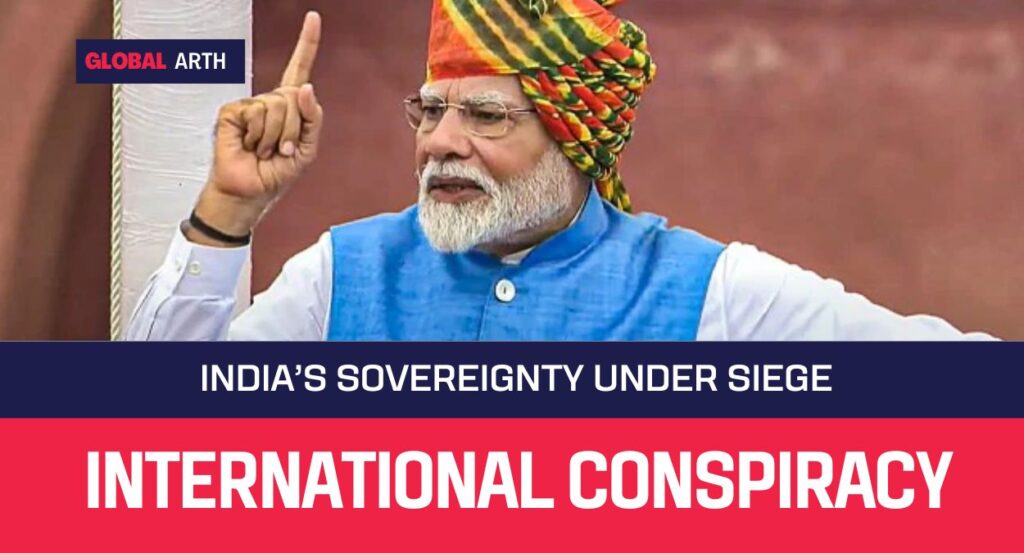As the dawn of Independence Day broke on August 15th, 2023, Prime Minister Narendra Modi’s fiery speech from the iconic Red Fort sent shockwaves across the globe. His powerful words, brimming with urgency and patriotism, did more than commemorate India’s freedom—they unmasked a looming, sinister international conspiracy against India.
Bangladesh: The Frontline of the Conspiracy
The unfolding events in Bangladesh have laid bare the depth of this conspiracy. Sheikh Hasina, the former Prime Minister of Bangladesh, recently disclosed a chilling revelation during her visit to India. She exposed how international forces, including the United States, pressured her to lease the strategically crucial St. Martin’s Island for a military base. The message was clear: comply, keep power, or resist and face dire consequences. This was not merely a geopolitical maneuver but a direct challenge to India’s influence in the region—a critical element of a broader international conspiracy against India.
St. Martin’s Island, near the Malacca Strait, holds immense strategic value. It’s a key maritime gateway through which a significant part of the world’s trade flows. A U.S. military base on this island would grant the United States unprecedented control over the Indian Ocean, potentially undermining India’s regional dominance. But, thanks to the unflinching efforts of Prime Minister Modi, Sheikh Hasina stood her ground, sacrificing her political future to protect her nation’s sovereignty and, by extension, India’s security.
America’s Strategic Interests: A Challenge for India
The U.S.’s interest in St. Martin’s Island is no secret. Control over this island would allow them to keep a close watch on the Malacca Strait, through which two-thirds of the world’s maritime traffic passes. This strategic location is not only crucial for global trade but also for maintaining a balance of power in the region. For the U.S., having a military base there would mean a greater ability to check and influence activities in the Indian Ocean, including those of India and China.
But, Sheikh Hasina’s refusal to acquiesce to American demands—reportedly influenced by her close ties with Modi—has put India in a precarious position. On one hand, it highlights the strength of India’s diplomatic relationships; on the other, it exposes the potential risks of antagonizing a global superpower like the United States.
Modi’s Diplomatic Strategy: A Balancing Act
Modi’s approach to foreign policy has always been one of pragmatism, with a clear focus on safeguarding India’s interests. His decision to keep strong ties with Russia, despite Western sanctions, is a prime example of this. By continuing to buy crude oil from Russia, India not only secured its energy needs at a lower cost but also helped stabilize the global oil market, indirectly benefiting Europe, which was facing an energy crisis due to the sanctions.
This move was not without its critics. Many in the West viewed India’s actions as undermining the sanctions regime against Russia. but, from India’s perspective, it was a necessary step to protect its economy and make sure energy security. The fact that India can navigate these complex geopolitical waters without alienating its key international partners is a testament to Modi’s diplomatic acumen.
A New World Order: India’s Role and Responsibility
As India’s global standing continues to rise, so too does the scrutiny of its actions on the world stage. Modi’s assertion that “India’s power is not a threat to the world” was not just a statement of intent; it was a reassurance to the global community that India’s rise would be peaceful and constructive. But as history has shown, emerging powers often face resistance from established ones.
The question remains: Is India facing a conspiracy aimed at destabilizing its rise, or is this merely the natural friction that occurs when a new power challenges the status quo? The reality is likely a combination of both. While there are undoubtedly forces that would prefer to see India stay a subordinate player in the global arena, there is also an undeniable momentum behind India’s rise that can’t be easily halted.
How do you perceive the growing international interference in South Asia? Can India continue to withstand these external pressures? Share your thoughts in the comments below, and stay connected with us on Facebook, Twitter, and WhatsApp for the latest updates!

